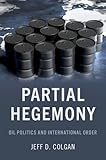Partial hegemony : oil politics and international order / Jeffrey Colgan.
Material type: TextPublication details: New York : Oxford University Press, c2021.Edition: 1st EditionDescription: vii, 289p ; 22cmISBN:
TextPublication details: New York : Oxford University Press, c2021.Edition: 1st EditionDescription: vii, 289p ; 22cmISBN: - 9780197546376
- 9780197546383
- 327.1/140973 23
- JZ1480 .C645 2021
| Item type | Current library | Collection | Call number | Copy number | Status | Date due | Barcode | |
|---|---|---|---|---|---|---|---|---|
 Books
Books
|
Zetech Library - Mang'u General Stacks | Non-fiction | JZ 1312 .C65 2021 (Browse shelf(Opens below)) | C1 | Available | Z012140 | ||
 Books
Books
|
Zetech Library - Mang'u General Stacks | Non-fiction | JZ 1312 .C65 2021 (Browse shelf(Opens below)) | C2 | Checked out | 08/11/2024 | Z012141 |
Browsing Zetech Library - Mang'u shelves, Shelving location: General Stacks, Collection: Non-fiction Close shelf browser (Hides shelf browser)

|

|

|

|

|

|

|
||
| JZ1242 .J33 2016 Introduction to international relations : theories and approaches / | JZ1305 .K38 2018 Introduction to international relations : theory and practice / | JZ 1312 .C65 2021 Partial hegemony : oil politics and international order / | JZ 1312 .C65 2021 Partial hegemony : oil politics and international order / | JZ1405 .D57 2024 Diplomatic tradecraft | JZ1405 .D57 2024 Diplomatic tradecraft | JZ 5538 .A45 2022 Interactive peacemaking : a people-centered approach / |
Includes bibliographical references and index.
"When and why does international order change? Easy to take for granted, international governing arrangements shape our world. They allow us to eat food imported from other countries, live safely from nuclear war, travel to foreign cities, profit from our savings, and much else. New threats, including climate change and simmering US-China hostility, lead many to worry that the "liberal order," or the US position within it, is at risk. Theorists often try to understand that situation by looking at other cases of great power decline, like the British Empire or even ancient Athens. Yet so much is different about those cases that we can draw only imperfect lessons from them. A better approach is to look at how the United States itself already lost much of its international dominance, in the 1970s, in the realm of oil. Only now, with several decades of hindsight, can we fully appreciate it. The experiences of that partial decline in American hegemony, and the associated shifts in oil politics, can teach us a lot about general patterns of international order. Leaders and analysts can apply those lessons when seeking to understand or design new international governing arrangements on topics ranging from climate change to peacekeeping, and nuclear proliferation to the global energy transition"--
There are no comments on this title.

